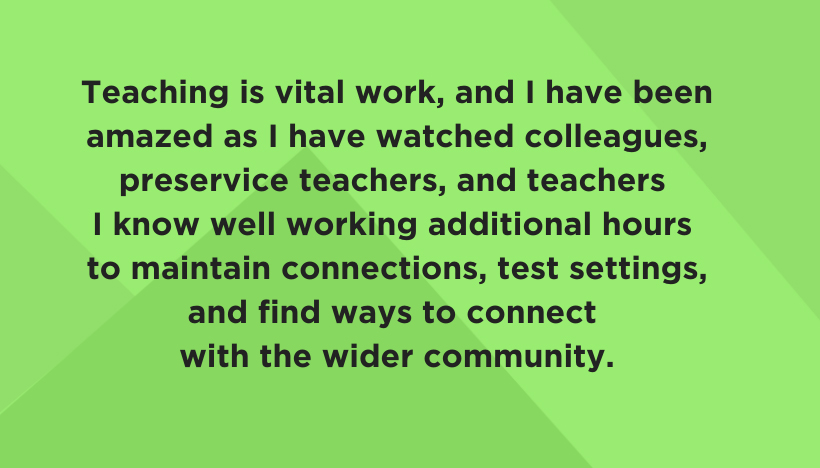This post was written by NCTE member Jason D. DeHart.
In retrospect, I have always believed that the work teachers do is powerful, but I have felt moments of shyness about discussing just how important education, and particularly English education, really is. I taught middle school English for eight years, I’m married to a middle school English teacher, and I now work as a teacher educator—yet the Covid-19 pandemic has reminded me that it is okay to declare that teachers do important work, and to be passionate about the value of what goes on in the world of education.
These are stressful times. Debates and discussions center around how school will look in the future, and when life can return to some sense of normality. Meanwhile, we experience grief and anticipate grief as more and more coronavirus cases are reported. Wherever students and teachers find themselves, the work they have done and continue to do during this time is a courageous in-crisis response.
I’d like to highlight three practices I’ve noticed over the past few months.
Making Connections in Digital Spaces
The shift to online instruction has been called unprecedented and uncharted. What teachers have done is essentially a comprehensive transporting of classroom life into digital and mobile spaces—and then engaged in the work of noticing who is not available in these spaces.
In my middle school classroom, I remember embracing technology in whatever way I could as it arrived, from the days of rolling projector carts to Promethean board technology. These days, my view of the value of digital literacy has not only served as a foundation for thinking about engagement—it is the whole and context of the work we are able to do with students, beyond paper packets.
Sadly, the fact of the digital divide has been surfaced in clear and certain terms, and we have work to do as advocates for our students.
At the time of this writing, libraries are still closed, while some leaders suggest that students should have class in parking lots so that they can experience access. We can do better.
As avid readers, we know the story that is told in noise and in silence.
Connecting with Authors
Amazingly, a number of authors have made their work available and engaged with students in online meetings. Author Christopher Crutcher has sent the message through social media that he has been readily available to join in online school interactions, and I have taken note as colleagues have invited speakers to their Zoom sessions and Google Meets.
My interest in graphic novels has led me to the work of a number of creators, including Dav Pilkey, Jarrett Krosoczka, and Jarrett Lerner. I have learned about presenting content in digital spaces from what these authors have done. It is difficult to learn in a pandemic, and sometimes it has been a challenge to focus on simple daily tasks—but these literary voices have provided opportunities to think about literacy practices.
Part of our work as teachers is about finding these authors, interacting with them, and sharing their stories with our students—all as an invitation to the children to grow into giving, caring authors one day who share their narratives and make their storytelling skills clear.
Why did I never think to connect with authors this way in my brick-and-mortar classroom?
Sustaining Community
Teaching is vital work, and I have been amazed as I have watched colleagues, preservice teachers, and teachers I know well working additional hours to maintain connections, test settings, and find ways to connect with the wider community. I have also been amazed as schools have contributed to communities by sharing lunches and meeting basic needs.
Schools are not simply places of learning—they are community-sustaining alternative homes, and the Covid-19 pandemic has made that very clear to me.
As English teachers, we have powerful work to do in feeding the mind, and our schools have important roles to play in feeding bodies. We make memories and so much more. As I write this, my wife is practicing a read-aloud of a book, and is about to record this text for her students. It is a book that she believes will make a connection, and she longs to hear student voices in response to this reading.
As I conclude, I am all the more impressed at the vital role educators play, and the role English teachers have in celebrating stories and reaching into the powerful modes of culture. This is emotional work.
The trite saying we sometimes hear from critics—“those who can’t do, teach”—doesn’t bear up under scrutiny. We know better—that teachers teach because they can do much, even in the face of seemingly insurmountable challenges.
I’m proud to be a teacher and to work with teachers.

Jason D. DeHart is an assistant professor in the department of Reading Education and Special Education at Appalachian State University, Boone, North Carolina. He can be reached at dehartjd@appstate.edu.
It is the policy of NCTE in all publications, including the Literacy & NCTE blog, to provide a forum for the open discussion of ideas concerning the content and the teaching of English and the language arts. Publicity accorded to any particular point of view does not imply endorsement by the Executive Committee, the Board of Directors, the staff, or the membership at large, except in announcements of policy, where such endorsement is clearly specified.

